人教版高中英语(新课标)必修四 Unit 5 Theme parks Warming up and reading课件(124张ppt)
文档属性
| 名称 | 人教版高中英语(新课标)必修四 Unit 5 Theme parks Warming up and reading课件(124张ppt) |
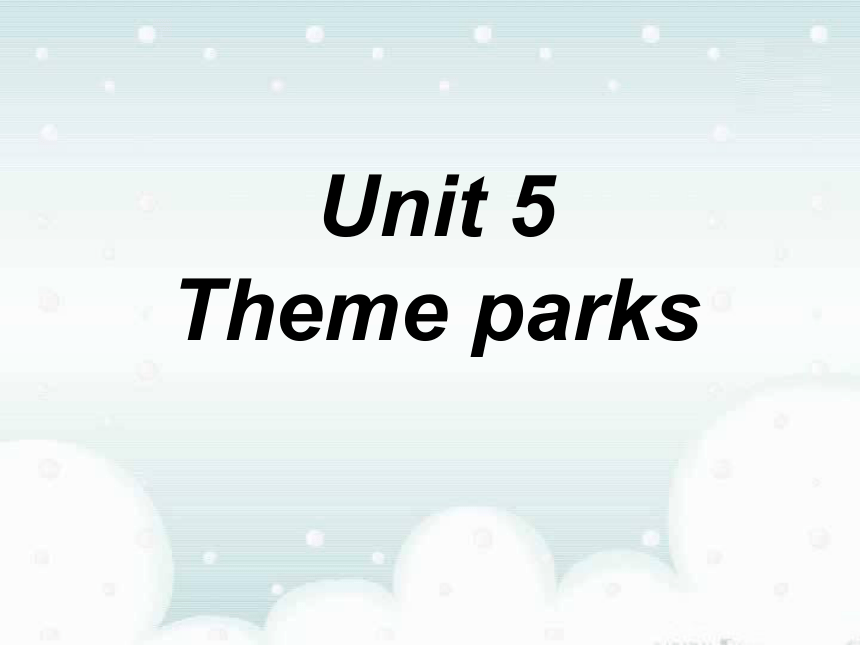
|
|
| 格式 | ppt | ||
| 文件大小 | 4.9MB | ||
| 资源类型 | 教案 | ||
| 版本资源 | 人教版(新课程标准) | ||
| 科目 | 英语 | ||
| 更新时间 | 2021-04-28 09:39:09 | ||
图片预览

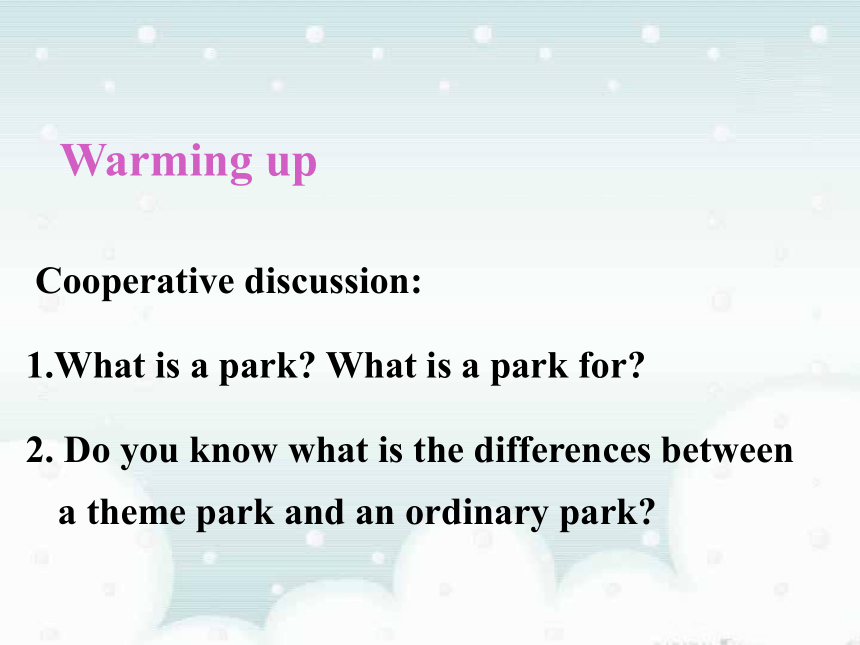
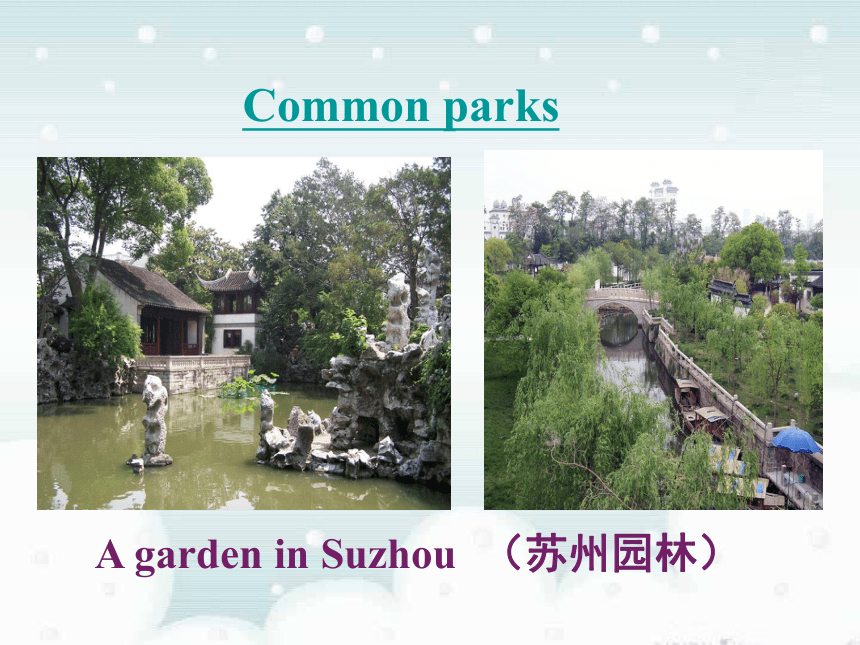
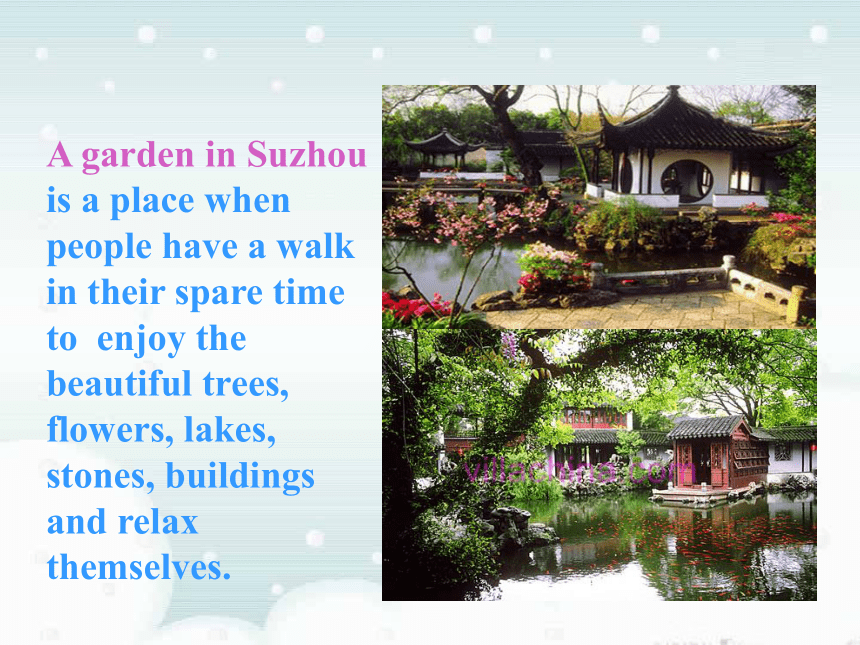
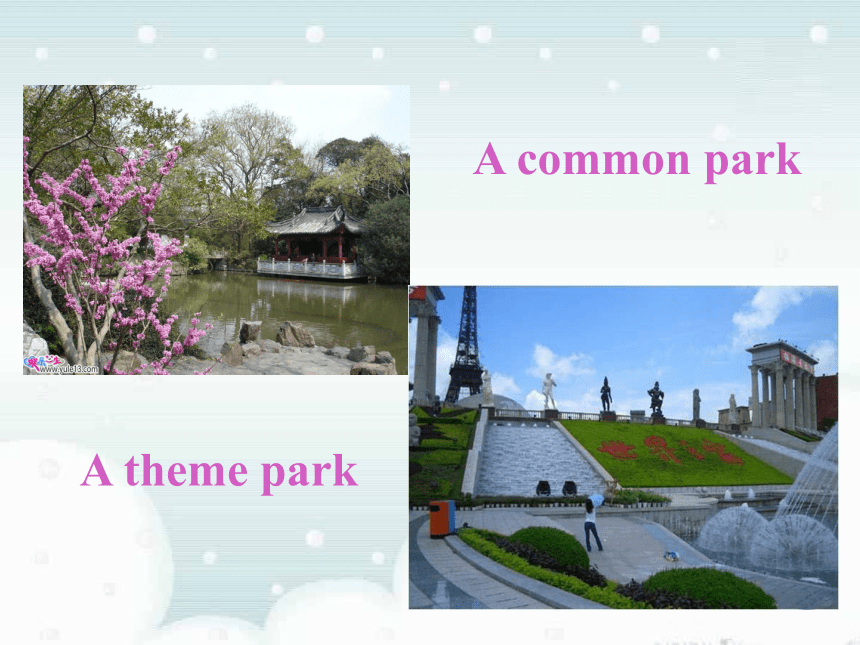
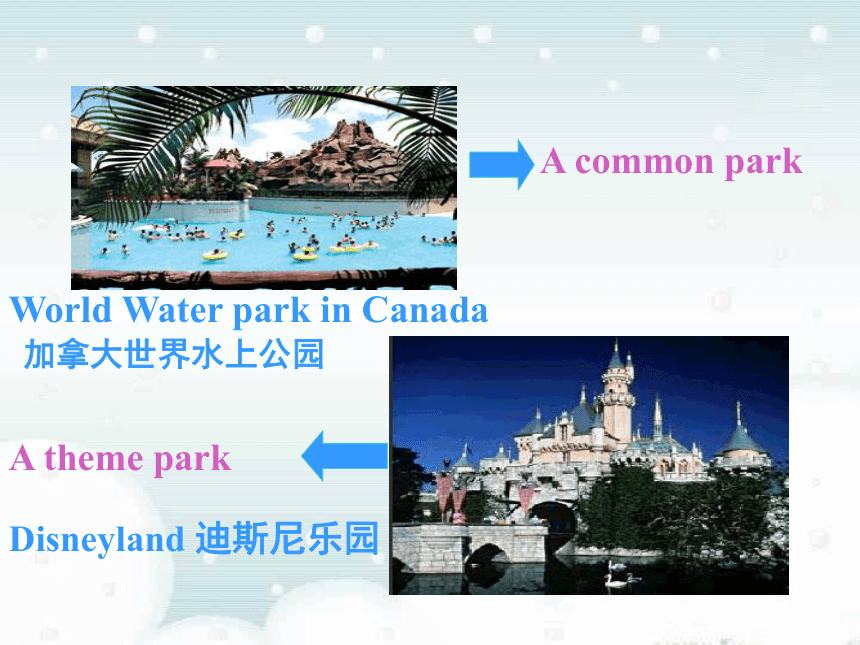


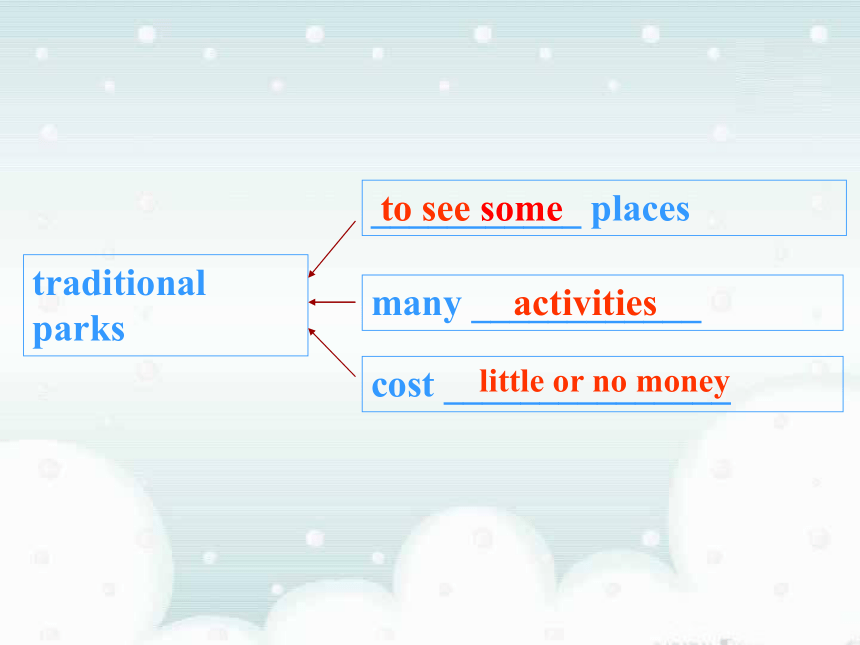
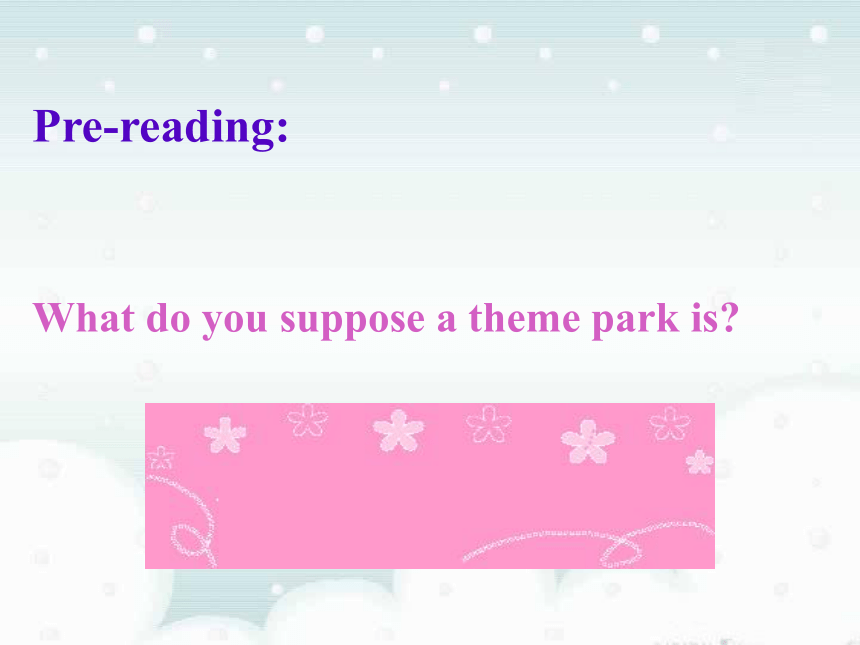
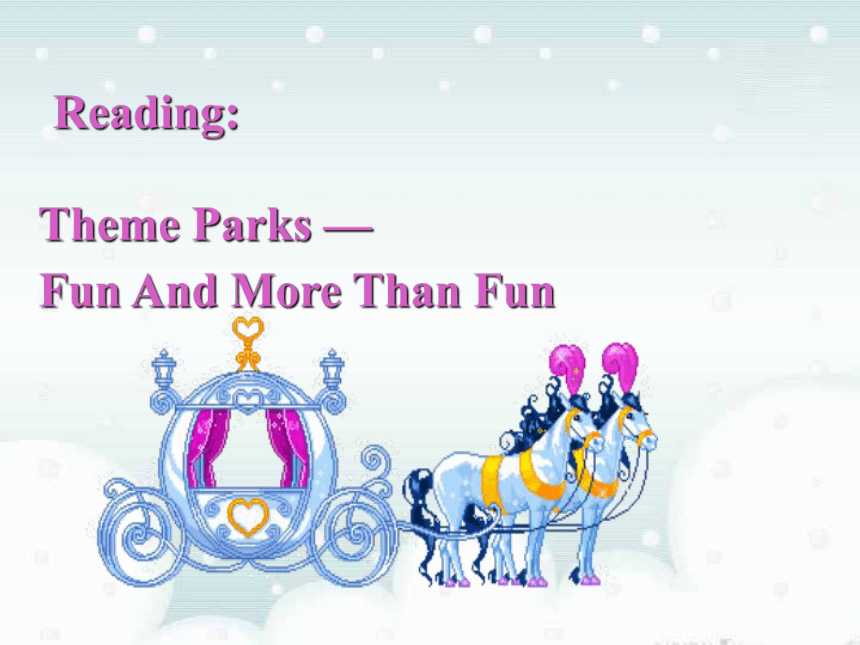
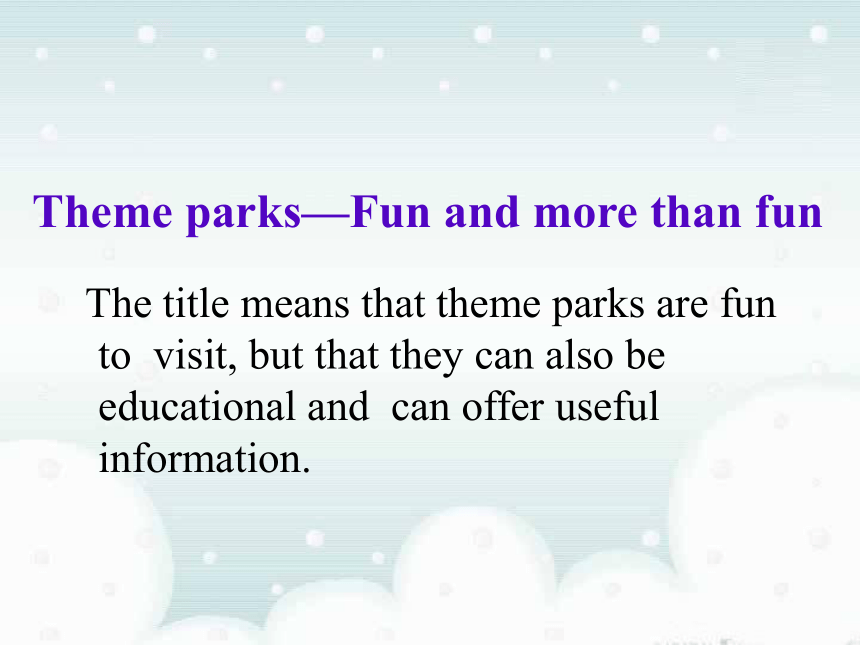
文档简介
(共124张PPT)
Unit
5
Theme
parks
Cooperative
discussion:
1.What
is
a
park?
What
is
a
park
for?
2.
Do
you
know
what
is
the
differences
between
a
theme
park
and
an
ordinary
park?
Warming
up
A
garden
in
Suzhou
Common
parks
(苏州园林)
A
garden
in
Suzhou
is
a
place
when
people
have
a
walk
in
their
spare
time
to
enjoy
the
beautiful
trees,
flowers,
lakes,
stones,
buildings
and
relax
themselves.
A
common
park
A
theme
park
World
Water
park
in
Canada
Disneyland
迪斯尼乐园
A
common
park
A
theme
park
加拿大世界水上公园
World
Water
park
in
Canada
is
a
park
where
people
can
take
part
in
all
kinds
of
activities
in
water.
Ocean
Park
in
Hong
Kong
___________
places
traditional
parks
cost
_______________
many
____________
to
see
some
activities
little
or
no
money
Pre-reading:
What
do
you
suppose
a
theme
park
is?
Theme
Parks
—
Fun
And
More
Than
Fun
Reading:
Theme
parks—Fun
and
more
than
fun
The
title
means
that
theme
parks
are
fun
to
visit,
but
that
they
can
also
be
educational
and
can
offer
useful
information.
Let’s
go
to
the
theme
parks
in
the
world.
A
theme
park
(Disneyland)
Disneyland
is
the
oldest
theme
park
in
the
world
and
it
is
the
most
popular
park
in
the
world,
too.
In
the
Disneyland,
people
can
not
only
enjoy
the
exciting
activities
there,
but
also
get
close
to
the
life-size
cartoon
characters
like
the
Mickey
Mouse
and
Donald
Duck.
Where
do
you
think
they
are?
A.
Theme
parks
are
more
than
amusement.
B.
Theme
parks
are
places
for
people
to
amuse
themselves.
C.
Theme
parks
have
a
variety
of
things
to
see
and
do.
D.
Theme
parks
have
a
certain
idea.
Skimming
1.
Read
the
passage
quickly
for
the
general
idea.
Give
the
main
idea
of
each
paragraph:
Para.
1:
Para.
2:
Para.
3:
Para.
4:
Different
kinds
of
theme
parks.
England’s
Camelot
Park
Disneyland.
Dollywood
1.What
do
parks
provide
people
with
?
Parks
provide
people
with
a
place
to
amuse
themselves
and
to
escape
their
busy
lives
for
a
while.
Careful
reading
2.
Do
theme
parks
have
a
certain
idea
?
Yes,
they
do.
Theme
parks
have
a
certain
idea
that
the
whole
park
is
based
on.
3.
What
is
the
purpose
of
Dollywood?
What
kind
of
people
do
you
think
will
visit
this
theme
park?
To
show
and
celebrate
America’s
traditional
southeastern
culture.
Probably
a
lot
of
Americans
will
visit
this
theme
park.
Purposes
for
building
theme
parks
purpose
Explanation
1
many
rides
to
go
on
and
shows
to
see
2
to
educate
3
to
entertain
visitors
can
learn
about
history,
cultures
and
science
to
make
profits
charge
for
admission,
rides
and
shows;
sell
souvenirs
and
advertise
them
on
TV.
Reading
comprehension:
Judge
true
(T)
or
false
(F)
□
□
1.
Disneyland
can
be
found
everywhere
.
Disneyland
can
be
found
in
several
parts
of
the
world.
2.
You
can
meet
any
cartoon
character
you
like
at
Disney
land
.
You
can
meet
fairy
tale
or
Disney
cartoon
characters
at
Disneyland.
×
True
False
□
□
×
3.
Tourism
develops
where
a
Disneyland
is
built.
4.
Dolly
wood
is
in
the
mountains
in
the
southeastern
USA.
5.
Country
music
singers
perform
in
Dolly
wood
throughout
the
whole
year.
□
□
√
True
False
□
□
√
□
□
√
6.
Dolly
wood
has
the
only
electric
train
still
working
in
the
USA
.
Dolly
wood
has
the
only
steam-engine
train
still
working
in
the
southeastern
USA.
□
□
×
True
False
7.
Visitors
to
Camelot
Park
can
taste
candy
like
the
candy
made
in
ancient
England
.
Visitors
to
Dollywood
can
taste
candy
like
the
candy
made
in
the
American
South
150
years
ago.
□
□
×
True
False
8.
Camelot
Park
has
the
oldest
roller
coaster
in
the
world
.
Camelot
Park
does
not
have
the
oldest
roller
coaster
in
the
world.
9.
Camelot
Park
has
an
ancient
English
farm
.
□
□
×
True
False
□
□
√
10.
Camelot
Park
has
places
for
visitors
to
watch
and
maybe
take
part
in
sword
fighting.
True
False
□
□
√
1.
theme:
e.g.
The
theme
for
tonight’s
talk
is
education.
They
played
the
theme
song
of
the
famous
film.
Language
points
a
main
subject
or
idea
2.
fun:
have
fun:
enjoy
oneself
尽情地玩
for
fun:
for
pleasure
为了娱乐
a
lot
of
/
much
/
no
fun
有趣/没趣
(be)
in
fun
在开玩笑
The
little
cat
is
full
of
fun.
e.g.
It’s
no
fun
spending
the
weekend
doing
nothing.
enjoyment;
pleasure
(U)
3.
more
than
在本句意为“不仅仅是……;不只是……”
This
book
is
more
than
a
grammar.
这不只是本语法书。
另外,
more
than
happy/glad/willing,
etc
(to
do
sth)表示“非常乐意(做某事)”。
We
are
more
than
happy
to
show
you
around
Beijing.
我非常乐意带你到北京到处看看。
4.various
不同的,各种各样的
There
are
various
colors
to
choose
from.
从这里到车站有各种不同的走法。
There
are
various
ways
of
getting
to
the
stations
from
here.
variety
n.
变化,多样性,种类
The
shopping
center
sells
a
variety
of
goods.
在学校里我们学习各种东西。
At
school
we
learn
a
variety
of
things.
She
made
the
children
glad
_________________
(用各种方法).
in
a
variety
of
ways
5.
As
you
wander
around
the
fantasy
amusement
park,
you
may
see
Snow
White
or
Mickey
Mouse
in
a
parade
or
on
the
street.
当你在梦幻乐园漫步时,你可能会在游行队伍中或者街上看到白雪公主或米老鼠。
1)
wander
(v.):
to
walk
slowly
across
or
around
an
area,
usually
without
a
clear
direction
or
purpose
漫步;徘徊
We
wandered
around
the
shopping
area
for
two
hours.
我们在这个购物区逛了两小时。
She
doesn’t
like
wandering
the
streets
aimlessly.
她不喜欢在大街上毫无目的地闲逛。
2)
amusement
(n.)
n.
消遣,娱乐(活动)
China’s
Cultural
Theme
Park
offers
its
visitors
all
kinds
of
amusement.
To
her
great
amusement
the
actor’s
wig(假发)
fell
off.
amuse
oneself
消遣,自我娱乐
e.g.The
children
amused
themselves
by
playing
hide-and-seek
games.
翻译:她读侦探(detective)小说消遣。
She
amused
herself
by
reading
detective
stories.
6.
With
all
these
attractions,
no
wonder
tourism
is
increasing
wherever
there
is
a
Disneyland.
有这么多引人入胜的东西,难怪哪里有迪斯尼乐园,哪里的旅游业就会发展。
no
wonder:
used
to
say
that
you
are
not
surprised
by
something
难怪;不足为奇(特别用于口语中)
No
wonder
you’ve
got
a
headache
–
you
drank
so
much
wine.
你喝了那么多酒,难怪你头疼。
This
is
their
first
time
to
Beijing
–
no
wonder
the
children
are
so
excited.
这是他们第一次到北京,难怪这些孩子们这么高兴。
wherever
(conj.
&
adv.):
to
or
at
any
place,
position
or
situation
无论哪里;无论什么情况下
She
is
followed
by
that
person
wherever
she
goes.
无论她去哪里,
那个人都跟着她。
You
can
sit
wherever
you
want.
你想坐哪里就坐哪里。
类似用法的还有whichever,
whatever,
whenever,
whomever等。
It
has
the
same
result
whichever
way
you
do
it.
不管你怎么做,
结果都一样。
Take
whichever
you
want.
你想拿哪个就拿哪个。
Whatever
I
have
also
belongs
to
you.
我所有的一切也属于你的。
Whatever
happens,
I’ll
always
be
on
your
side.
不管发生什么事,
我总会站在你一边的。
第五单元第四课时
Warming
up
Cooperative
discussion:
1.
Have
you
ever
been
to
some
parks?
2.
What
kind
of
activities
do
people
do
in
a
park?
Park
is
used
to
provide
people
with
a
place
to
amuse
and
relax
themselves.
Theme
park
is
a
park
which
has
a
special
theme,
for
example,
ocean,
animals,
plants,
etc.
Parks
of
the
world
Scanning
China
Folk
Culture
Village
Shenzhen
Happy
Valley
Skimming:
While
listening,
get
some
information
about
the
three
theme
parks
and
decide
if
the
statements
on
page
35
are
true
or
false.
Scanning
Read
the
text
carefully
to
find
detailed
information.
Paragraph
2
Disneyland
is
a
place
to
have
fun.
What
can
you
do
if
you
have
a
chance
to
visit
Disneyland?
travelling
through
space
visiting
a
pirate
ship
meeting
favourite
fairy
tale
or
Disney
cartoon
character
exciting
rides
(giant
swinging
ships…
terrifying
free-fall
drops…)
Paragraph
3
What
is
the
purpose
of
Dollywood?
What
kind
of
people
do
you
think
will
visit
this
theme
park?
What
are
the
features
of
Dollywood?
country
music
performance
carpenters
and
other
craftsmen
make
wood,
glass
and
iron
objects
the
candy
shop
take
a
ride
on
the
only
steam-engine
train
see
bald
eagles
in
the
world’s
largest
bald
eagle
preserve
one
of
the
best
old
wooden
roller
coasters
steam-engine
train
bald
eagle----
the
national
bird
of
USA
Paragraph
4
What
is
the
theme
of
Camelot
Park?
What
activities
can
you
imagine
there
are
at
Camelot
Park?
If
you
have
a
chance
to
visit
one
of
these
three
parks
,
which
will
you
visit?
Why?
第五单元第五课时
Comprehending
Discussion
Word
studies
in
the
passage
Comprehending
What’s
the
meaning
of
the
title
“Theme
parks—fun
and
more
than
fun”?
It
means
that
theme
parks
are
fun
to
visit,
but
that
they
can
also
be
educational
and
can
offer
useful
information.
If
you
have
enough
time
and
money,
would
you
like
to
go
traveling
to
see
the
natural
beauty
of
the
country
or
go
to
the
theme
park
to
enjoy
yourselves?
There
are
various
kinds
of
theme
parks
,
with
a
different
park
for
almost
everything
:
food
,culture
,
science
,
cartoons
,
movies
or
history
.
有各种各样的主题公园,不同的公园有不同的主题,但几乎囊括了一切:
食物
,
文化
,
科学
,
动画片
,
电影或历史。
almost
的用法
:
almost
为副词,相当于nearly
,
意为”几乎;差不多”.与动词,形容词,副词连用时,二者可通用.
例如:
For
the
last
ten
years
of
her
life
,
she
was
almost
/
nearly
blind
.
在她生命的最后十年里,她几乎完全失明了.
She
slipped
and
almost
/
nearly
fell.
她滑了一跤,几乎跌倒了.
I
have
been
told
the
supper
is
almost
/
nearly
ready
.
我被告知晚饭差不多准备好了。
(2)almost
可与
no
,none
,nothing
,never
等不定词连用,而nearly
不能。
例如:
Almost
everyone
likes
music
.
几乎人人都喜欢音乐。
Almost
no
one
knows
the
truth
.
几乎没有人知道真相。
(3)与具体数字连用时用nearly.
例如:
She
is
nearly
twenty
years
old
.
她差不多二十岁了.
2.Whichever
and
whatever
you
like
,
there
is
a
theme
park
for
you
!
无论你喜欢哪一个,
不管你喜欢什么,
都会有一个适合你的主题公园!
whatever的用法:
whatever
pron.
无论什么;
不管什么;
凡是…的事物.
例如:
We
‘ll
do
whatever
the
Party
calls
upon
us
to
do
.
党号召我们做什么,我们就做什么.
Take
whatever
you
want.你要什么就拿什么吧.
We
are
determined
to
fufil
the
task
,
whatever
happens.
不管发生什么事,我们决心完成任务.
(2)
whatever
adj.
无论什么样的
辨析:
Whatever,
no
matter
what
的用法区别
(1)
whatever
相当于
no
matter
what
,
引导让步状语从句,意为"不管".
(2)
whatever
引导名词性从句时,在句中作主语,宾语,表语等.
例如:
You
can
take
whatever
farm
tools
you
need
.
你们需要什么样的农具,都可以拿.
Whatever
dictionary
you
have
,
lend
it
to
me
.
不管你有什么词典,借给我.
(3)
whatever
(whoever
,
whichever
,
whomever等)既可引导让步状语从句,也可引导名词性从句。
例如:
She
says
that
her
cellphone
helps
her
do
whatever
she
wants
to
do.
她说她的手机帮她做她想做的任何事情。
I
won‘t
believe
you
,
no
matter
what
you
may
say
.
无论你要说什么,我都不会相信你的。
3.The
theme
park
you
are
probably
most
familiar
with
is
Disneyland
.
可能你最熟悉的主题公园就是迪斯尼乐园。
注意:
此句中whatever
引导的是名词性从句,不能用no
matter
what
来代替,但whatever
可以代替no
matter
what
引导让步状语从句。
familiar
adj.熟悉的;通晓的。常用短语;
be
familiar
with......
熟悉......,通宵......;
be
familiar
to
......为.....所熟悉。
例如:
a
familiar
voice
一个熟悉的声音
Yang
Liwei
is
a
name
familiar
to
everybody
in
China
.
在中国,杨利伟是一个每个人都熟悉的名字。
He
is
familiar
with
English
.
他通晓英语。
4.......Disneyland
also
has
many
exciting
rides,
ride
的用法:
(1)
ride
n.(乘车或骑车的)短途旅程。
......
迪斯尼乐园也有许多令人兴奋的兜风
例如:
He
went
for
a
ride
in
his
car
.
他坐小汽车去转了一圈。
(2)ride
v.乘;骑;坐。
e.g:
She
was
riding
a
bicycle
.
她正骑这一辆自行车。
They
rode
in
the
back
seats
of
the
bus
.
他们坐在公共汽车后面的座位上。
拓展:与ride相关的短语:
give
sb
a
ride
让人骑马/乘车;
take
sb
for
a
ride
欺骗或诈骗某人。
5.If
you
do
well
there
,
King
Arthur
may
choose
you
to
fight
in
the
big
jousting
tournament
.
如果你在那儿表现好的话,亚瑟王可能会选中你在骑这马用的长毛打斗的锦标赛中战斗。
辨析:choose,
choose
from
的用法区别
(1)choose
vt.
选择;挑战;选中。
例如:
Choose
three
from
these
books
.
从这些书中挑选出三本来。
There
is
nothing
to
choose
between
the
two
.
两者一样
/
差不多,没什么可挑的。
Whom
shall
we
choose
as
our
team
leader
?
我们选谁当队长?
固定搭配:choose
to
喜欢;愿意;决心。
例如:
Tom
chose
to
stay
at
home
rather
than
go
fishing.
汤姆宁愿待在家里也不愿去钓鱼。
(2)choose
from
...从...中选,后接选择的范围。
例如:
These
samples
are
for
you
to
choose
from.
这些样品是供你选择的。
These
are
ten
kinds
of
paper
to
choose
from.
有10种纸可供选择。
6.Tourism
develops
where
a
Disneyland
is
bulit.
develop
的用法:
(1)develop
v.
发展。
例如:
Things
develop
ceaselessly.
事情总是发展的。
Develop
a
new
business
发展一家新商行。
(2)develop
v.
(逐步)展开。
例如:
develop
an
argument
point
by
point
逐步展开论点
旅游业在迪斯尼乐园被建的地方发展。
拓展:
(1)development
n.发展;进展。
例如:
the
rapid
development
of
China‘s
industry
中国工业的迅速发展
例如:
China
is
a
developing
country
while
Japan
is
a
developed
country
.
中国是一个发展中国家,而日本是一个发达国家。
(2)develop
adj.发展中的
developed
adj.发达的
where
a
Disneyland
is
built
是由
where
引导的地点壮语从句。
例如:
Where
there
is
oppression
,
there
is
resistance
.
哪里有压迫,哪里就有反抗。
Go
where
one
is
most
needed
by
the
motherland
.
到祖国最需要的地方去。
This
is
where
I
live.
我就住这里。
第五单元第六课时
taste的用法
take
part
in
和join的用法
know,
know
of和know
about
imagine的用法
chance的用法
1.Visitors
to
Camelot
park
can
taste
candy
like
the
candy
made
in
ancient
England.
去卡默洛特公园的参观者可以品尝到和古代英格兰制作的一样的糖果。
taste
的用法:
(1)taste
作动词时,既可以用作系动词,又可以作为动词,意为“尝;尝起来;吃(食物),喝(液体)“。
例如:
Please
taste
the
soup
and
see
if
it
has
enough
salt
.
请尝一口汤,看看盐够不够。
The
patient
has
not
tasted
food
for
two
days
.
病人两天没吃东西了。
One
can
taste
nothing
when
one
has
a
cold
.
感冒时吃东西没有味道。
It
tastes
sweet
.
这东西尝起来很甜。
Good
medicine
tastes
bitter
to
the
mouth.
良药苦口。
(2)
taste
作名词时,意为“味道;嗜好;爱好;鉴赏力”。
常用短语:have
a
/
an
...
taste
有...的味道;show
good
taste
in
....对...有鉴赏力;have
a
taste
for
/
in
...喜好.....;to
one's
taste
合某人的口味;in
good
taste
雅致,(行为)高尚。
例如:
She
has
a
taste
for
pop
music.
她喜欢流行音乐。
Jazz
is
liked
by
many
people
,
but
it‘s
not
to
everyone’s
taste.
爵士乐受很多人的欢迎但并不是合乎每个人的口味。
2.Camelot
Park
has
places
for
visitors
to
watch
and
maybe
take
part
in
sword
fighting
.
卡默洛特公园有一些可以让参观者观看并且或许参与剑术的比拼中来的地方。
辨析:
take
part
in,
join
in
,
join
,
attend
的用法区别
take
part
in
/
join
in
+
活动;
join
sb
in
sth
和某人一起做某事;
join
+
组织,政党,团体等;
attend
a
meeting
/
a
lecture
...参加会议/听演讲等。
例如:
Many
students
took
part
in
/
joined
in
the
game.
许多学生参加了这个游戏。
Will
you
join
us
in
playing
basketball
?
你和我们一起打篮球好吗?
join
the
navy
加入海军
join
the
union
加入一个工会
The
meeting
was
well
attended
.
到会的人很多。
3.What
do
you
know
about
ancient
English
stories
?
关于古代英国的故事你都知道哪些?
辨析:know
,know
of
,
know
about
的用法区别
(1)know
意为“知道;了解;懂得”。是指直接的了解,而不是道听途说的转述。
例如:
He
knew
the
subject
so
well
that
he
could
answer
the
most
difficult
questions
with
ease.
他非常精通这们学科,及时最难的问题也能对答如流。
Let
me
know
by
telephoneimmediately.
请立即电话通知我。
As
far
as
I
know
,
they
will
be
back
in
a
few
days
.
据我所知,他们过几天就回来。
(2)know
of
意为
“知道;听说”,与know不同的是,
这里所讲的“知道”是指间接地知道。
例如:
I
know
of
her
,
but
have
not
met
her
yet.
我听说过她,但没有见过她。
There
is
only
one
way
that
I
know
of
to
pass
examinations
and
that
is
to
work
hard
and
be
fully
prepared
.
据我所知,要想通过考试只有一条路,那就是努力学习,作好充分的准备。
(3)know
about
意为“知道...的情况;了解”,与know
of
不同的是,know
about通常表示了解较为详细的情况,而know
of
仅仅表示"听说过",一般不涉及详细情况.
例如:
Nothing
is
known
about
his
early
life
in
Holland
.
大家对他早年在荷兰的生活一无所知。
Did
you
know
about
your
son's
shocking
behaviour
at
the
club
last
night?
你知道你儿子昨晚在俱乐部那种令人震惊的行为么?
4.What
other
avtivities
do
you
imagine
there
are
at
Camelot
Park?
你想像一下在卡默洛特公园还有其他什么活动?
imagine
vt.
想像。
常用结构:imagine
sth
/
imagine
doing
sth
/
imagine
sb
to
be
/
imagine
sb
to
have
done
/
imagine
that
clause.
imagine
后面的宾语必须是名词,代词或动名词;imagine
后面的复合宾语必须是
to
be(不能是to
do)或to
have
done,
类似于imagine这样的用法的词还有know
,
consider
,understand,
realise
,
recognise
等。
Scientists
consider
Bell
to
have
invented
the
telephone.
我想你对政治不感兴趣。
我很难想像就那样躺着。我会疯的。
你为他设身处地想一想。
科学家们认为是贝尔发明了电话。
I
can't
imagine
lying
like
that
,
I
would
go
crazy
.
Imagine
yourself
(to
be)
in
his
place.
I
imagine
you
are
not
interested
in
politics.
5.What
will
you
do
if
you
have
a
chance
to
visit
Disneyland?
如果你有机会参观迪斯尼乐园你将做什么?
chance
的用法:
(1)chance
n.
相当于possibility
,意为“可能性;偶然性;运气;机会”。
e.g.:
蛇藏在那里的可能性总是有的
我们成功的把握有多大?
There
is
always
a
chance
of
a
snake
hiding
there.
What
chance
of
success
do
we
have
?
Mr
Smith
wanted
to
give
John
a
chance
.
听其自然吧。
玩扑克牌许多时候靠运气。
如果我再给你一次机会,你能答应改好么?
史密斯先生想给约翰一个机会。
Let's
leave
it
to
a
chance
.
Chance
plays
an
important
part
in
many
card
games
.
If
I
give
you
a
second
chance
,
will
you
promise
to
be
good
?
(2)chance
vi.相当于happen,意为“偶然发生;碰巧”。
常用结构:
Sb
chances
to
do
...;It
chances
that...。
我在街上碰巧碰到了一位同学。
碰巧那时我在乡村。
I
chanced
to
meet
an
old
classmate
in
the
street.
It
chanced
that
I
was
in
the
country
at
that
time.
例如:
第五单元第七课时
theme的用法
various的用法
be
famous
for
whichever
amusement
attraction
no
wonder
unique
preserve
length
New
words
theme
n."题目;主题(曲)".
theme
例如:
theme
song
主题歌
theme
park
主题公园
The
students
are
discussing
the
theme
of
a
novel
.
学生们正在讨论小说的主题.
various
作形容词,意为"不同的;各种各样的".
various
例如:
These
are
various
colours
to
choose
from.
有各种各样的颜色可供选择.
These
are
various
ways
of
getting
to
the
station.去车站有各种不同的路.
拓展:
(1)variety
n.变化;多样化;种类;综艺节目。
例如:
The
shopping
centre
sells
a
variety
of
goods
.这个购物中心出售许多种商品。
When
the
news
of
a
ree
variety
show
at
our
loval
cinema
got
round
,
we
all
rushed
to
see
it
.当我们本地电影院免费综艺节目的消息传出时,我们都赶快去跑观看。
At
school
we
learn
a
variety
of
things
.
在学校我们学习各种东西。
固定搭配:
a
considerable
/
great
/wide
variety
of
各种各样的,种类繁多的;
variety
of
form
各种形式;
for
a
variety
of
reasons
因种种理由;
in
variety
of
ways
用种种方法。
(2)vary
v.
变化;改变。
例如:
Habits
and
hobbies
vary
from
person
to
person.
习惯与爱好因人而异。
The
temperature
varied
throughout
the
day
.
气温--整天变化无常。
be
famous
for
意为“以...而闻名”。
be
famous
for
例如:
This
is
a
place
famous
for
its
hot
springs
.
这个地方以其温泉而著名。
拓展:
well--known
adj.
众所周知;著名的;闻名的。be
well--known
/
famous
as
表示“作为某中身份而闻名”,后接表示人的身份,职业的词语;be
well--known
/
famous
for
意为“因为......而闻名”,其后多接表示某个人或物的特点,特长,技能等方面的词语。
注意:
well--known
的比较是better
--
known,
同义词是famous.
e.g.
He
is
a
well--know
writer.
他是一位著名的作家。
Hangzhou
is
well--known
/
famous
for
the
West
Lake.
杭州以西湖而闻名。
whichever
为代词,意为“无论哪一个,任何一个”
.
whichever
例如:
You
may
choose
whivhever
you
want
.
你要哪一个,就可以挑选哪一个。
Whichever
of
us
fulfils
his
task
first
will
lend
a
helping
hand
to
others
.
我们之中无论谁先做万自己的工作就都会去帮助别人。
拓展:
whichever
adj.无论那个;无论哪些。
e.g.
Take
whichever
seat
you
like
.
你喜欢哪个座位就挑哪个。
Whichever
book
you
borrow,
you
much
return
it
in
a
week
.
你无论借哪本书,都必须一周内归还。
amusement
n.
“消遣;娱乐(活动)”。
amusement
例如:
an
amusement
park
一个公共游乐场
拓展:
(1)
amusing
adj.
引起乐趣的,逗人笑的。例如:
an
amusing
story
一个好笑的故事。
(2)
amuse
v.
使(某人)消遣;使喜悦。
e.g.
I
did
some
crosswords
to
amuse
myself
on
the
journey
.
在旅途中,我以玩儿纵横字谜为消遣。
I
have
bought
a
few
toys
to
amuse
the
children.
我买了一些玩具使孩子们高兴。
(3)
amuse
v.
逗(某人)笑。
e.g.
We
were
greatly
amused
at
/
by
Ma
Sanli‘s
cross
talk
.
我们听了马三立的响声都笑了起来。
Everybody
laughed
,but
I
couldn‘t
understand
what
amused
them.
每个人都笑了起来,但我不明白是什么逗笑了他们。
attraction
n.有吸引力的事物;吸引
attraction
e.g.
The
display
of
fireworks
offers
many
attractions.
焰火表演很吸引人.
attraction
sphere
吸引球
例如:
The
attraction
of
the
moon
for
the
earth
causes
the
sides.月球对低的引力引起潮汐.
注意:
attraction
n.
引力.常用短语:
attraction
of
gravity
重力;
magnetic
attraction
磁力.
拓展:
(1)
attract
v.
吸引.
例如:
Like
attracts
like
.
物以类聚.
A
magnet
attracts
iron.磁石吸铁.
(2)
attract
v.
引起(注意,兴趣,赞赏等);诱惑.
例如:
attract
one’s
attention
引起某人的注意
attract
moths
with
lamps
点灯诱蛾
(3)
attractive
adj.
有吸引力的;引人注意的.
例如:
an
attractive
woman
一个动人的女人
no
wonder
意为“难怪,不足为奇”。
no
wonder
e.g.
He
had
made
a
thorough
investigation.No
wonder
he
knew
so
much
about
it
.
他进行了一次彻底的调查。难怪他对此事了解很多。
拓展:
(1)wonder
n.
惊异;惊奇;惊叹。
例如:
a
look
of
wonder
惊异的神情
watch
the
conjuror
in
silent
wonder
一声不响惊奇的看这魔术师
(2)wonder
n.
奇迹;奇观;奇才;奇事;
例如:
do
wonders
创造奇迹
The
ivory
work
is
a
wonder
of
delivate
workmanship.
这件象牙雕刻是手艺精巧的珍品。
(3)wonder
vi.
感到惊讶;惊叹。
(4)wonder
vi.
感到奇怪;疑惑;
e.g.
I
wonder
at
his
doing
that
.
我对他那样做感到惊讶。
e.g.
What
are
you
wondering
about
?
你在对什么感到疑惑?
(5)wonder
vt.对....感到奇怪;想知道。
例如:
I
wonder
who
he
is
,
where
he
comes
from
and
why
he
came
.
我想知道他是谁。从哪里来和为什么
。
I
wondered
what
the
cchild
was
doing.
我想知道那个孩子在做什么。
unique
adj.
独一无二的;仅有的
unique
e.g.
an
unique
experience一次独特的经历
The
problem
is
by
no
means
unique
to
this
region
拓展:
unique
adj.
珍奇的;罕有的;不平凡的;极好的。
e.g.
unique
ability
罕见的才能
preserve
vt.
“保存;保留”。
preserve
e.g.
Salt
and
spices
help
to
preserve
meat.
盐和调味品有助与保存肉类。
拓展:
1).preserve
vt.
保护;防护;维护。
e.g.
preserve
forests
保护森林
preserve
one's
eyesight
保护势利
He
always
preserves
the
style
of
hard
struggle
.
他始终保持艰苦奋斗的作风。
2)
.
preserve
n.
“保护区”。
e.g.
This
is
the
world‘s
largest
narural
preserve
.
这是世界上最大的自然保护区。
length
n.
“长度;长”。
length
例如:
a
pigsty
15
metres
in
length
and
5
metres
in
width
一个长15米宽5米的猪圈
拓展:
at
length
最后,终于;详细地。
e.g.
speak
at
great
length
详细地讲了好久
They
debated
this
subject
at
length.
他们对这一题目进行了详细的辩论。
Bye!
Unit
5
Theme
parks
Cooperative
discussion:
1.What
is
a
park?
What
is
a
park
for?
2.
Do
you
know
what
is
the
differences
between
a
theme
park
and
an
ordinary
park?
Warming
up
A
garden
in
Suzhou
Common
parks
(苏州园林)
A
garden
in
Suzhou
is
a
place
when
people
have
a
walk
in
their
spare
time
to
enjoy
the
beautiful
trees,
flowers,
lakes,
stones,
buildings
and
relax
themselves.
A
common
park
A
theme
park
World
Water
park
in
Canada
Disneyland
迪斯尼乐园
A
common
park
A
theme
park
加拿大世界水上公园
World
Water
park
in
Canada
is
a
park
where
people
can
take
part
in
all
kinds
of
activities
in
water.
Ocean
Park
in
Hong
Kong
___________
places
traditional
parks
cost
_______________
many
____________
to
see
some
activities
little
or
no
money
Pre-reading:
What
do
you
suppose
a
theme
park
is?
Theme
Parks
—
Fun
And
More
Than
Fun
Reading:
Theme
parks—Fun
and
more
than
fun
The
title
means
that
theme
parks
are
fun
to
visit,
but
that
they
can
also
be
educational
and
can
offer
useful
information.
Let’s
go
to
the
theme
parks
in
the
world.
A
theme
park
(Disneyland)
Disneyland
is
the
oldest
theme
park
in
the
world
and
it
is
the
most
popular
park
in
the
world,
too.
In
the
Disneyland,
people
can
not
only
enjoy
the
exciting
activities
there,
but
also
get
close
to
the
life-size
cartoon
characters
like
the
Mickey
Mouse
and
Donald
Duck.
Where
do
you
think
they
are?
A.
Theme
parks
are
more
than
amusement.
B.
Theme
parks
are
places
for
people
to
amuse
themselves.
C.
Theme
parks
have
a
variety
of
things
to
see
and
do.
D.
Theme
parks
have
a
certain
idea.
Skimming
1.
Read
the
passage
quickly
for
the
general
idea.
Give
the
main
idea
of
each
paragraph:
Para.
1:
Para.
2:
Para.
3:
Para.
4:
Different
kinds
of
theme
parks.
England’s
Camelot
Park
Disneyland.
Dollywood
1.What
do
parks
provide
people
with
?
Parks
provide
people
with
a
place
to
amuse
themselves
and
to
escape
their
busy
lives
for
a
while.
Careful
reading
2.
Do
theme
parks
have
a
certain
idea
?
Yes,
they
do.
Theme
parks
have
a
certain
idea
that
the
whole
park
is
based
on.
3.
What
is
the
purpose
of
Dollywood?
What
kind
of
people
do
you
think
will
visit
this
theme
park?
To
show
and
celebrate
America’s
traditional
southeastern
culture.
Probably
a
lot
of
Americans
will
visit
this
theme
park.
Purposes
for
building
theme
parks
purpose
Explanation
1
many
rides
to
go
on
and
shows
to
see
2
to
educate
3
to
entertain
visitors
can
learn
about
history,
cultures
and
science
to
make
profits
charge
for
admission,
rides
and
shows;
sell
souvenirs
and
advertise
them
on
TV.
Reading
comprehension:
Judge
true
(T)
or
false
(F)
□
□
1.
Disneyland
can
be
found
everywhere
.
Disneyland
can
be
found
in
several
parts
of
the
world.
2.
You
can
meet
any
cartoon
character
you
like
at
Disney
land
.
You
can
meet
fairy
tale
or
Disney
cartoon
characters
at
Disneyland.
×
True
False
□
□
×
3.
Tourism
develops
where
a
Disneyland
is
built.
4.
Dolly
wood
is
in
the
mountains
in
the
southeastern
USA.
5.
Country
music
singers
perform
in
Dolly
wood
throughout
the
whole
year.
□
□
√
True
False
□
□
√
□
□
√
6.
Dolly
wood
has
the
only
electric
train
still
working
in
the
USA
.
Dolly
wood
has
the
only
steam-engine
train
still
working
in
the
southeastern
USA.
□
□
×
True
False
7.
Visitors
to
Camelot
Park
can
taste
candy
like
the
candy
made
in
ancient
England
.
Visitors
to
Dollywood
can
taste
candy
like
the
candy
made
in
the
American
South
150
years
ago.
□
□
×
True
False
8.
Camelot
Park
has
the
oldest
roller
coaster
in
the
world
.
Camelot
Park
does
not
have
the
oldest
roller
coaster
in
the
world.
9.
Camelot
Park
has
an
ancient
English
farm
.
□
□
×
True
False
□
□
√
10.
Camelot
Park
has
places
for
visitors
to
watch
and
maybe
take
part
in
sword
fighting.
True
False
□
□
√
1.
theme:
e.g.
The
theme
for
tonight’s
talk
is
education.
They
played
the
theme
song
of
the
famous
film.
Language
points
a
main
subject
or
idea
2.
fun:
have
fun:
enjoy
oneself
尽情地玩
for
fun:
for
pleasure
为了娱乐
a
lot
of
/
much
/
no
fun
有趣/没趣
(be)
in
fun
在开玩笑
The
little
cat
is
full
of
fun.
e.g.
It’s
no
fun
spending
the
weekend
doing
nothing.
enjoyment;
pleasure
(U)
3.
more
than
在本句意为“不仅仅是……;不只是……”
This
book
is
more
than
a
grammar.
这不只是本语法书。
另外,
more
than
happy/glad/willing,
etc
(to
do
sth)表示“非常乐意(做某事)”。
We
are
more
than
happy
to
show
you
around
Beijing.
我非常乐意带你到北京到处看看。
4.various
不同的,各种各样的
There
are
various
colors
to
choose
from.
从这里到车站有各种不同的走法。
There
are
various
ways
of
getting
to
the
stations
from
here.
variety
n.
变化,多样性,种类
The
shopping
center
sells
a
variety
of
goods.
在学校里我们学习各种东西。
At
school
we
learn
a
variety
of
things.
She
made
the
children
glad
_________________
(用各种方法).
in
a
variety
of
ways
5.
As
you
wander
around
the
fantasy
amusement
park,
you
may
see
Snow
White
or
Mickey
Mouse
in
a
parade
or
on
the
street.
当你在梦幻乐园漫步时,你可能会在游行队伍中或者街上看到白雪公主或米老鼠。
1)
wander
(v.):
to
walk
slowly
across
or
around
an
area,
usually
without
a
clear
direction
or
purpose
漫步;徘徊
We
wandered
around
the
shopping
area
for
two
hours.
我们在这个购物区逛了两小时。
She
doesn’t
like
wandering
the
streets
aimlessly.
她不喜欢在大街上毫无目的地闲逛。
2)
amusement
(n.)
n.
消遣,娱乐(活动)
China’s
Cultural
Theme
Park
offers
its
visitors
all
kinds
of
amusement.
To
her
great
amusement
the
actor’s
wig(假发)
fell
off.
amuse
oneself
消遣,自我娱乐
e.g.The
children
amused
themselves
by
playing
hide-and-seek
games.
翻译:她读侦探(detective)小说消遣。
She
amused
herself
by
reading
detective
stories.
6.
With
all
these
attractions,
no
wonder
tourism
is
increasing
wherever
there
is
a
Disneyland.
有这么多引人入胜的东西,难怪哪里有迪斯尼乐园,哪里的旅游业就会发展。
no
wonder:
used
to
say
that
you
are
not
surprised
by
something
难怪;不足为奇(特别用于口语中)
No
wonder
you’ve
got
a
headache
–
you
drank
so
much
wine.
你喝了那么多酒,难怪你头疼。
This
is
their
first
time
to
Beijing
–
no
wonder
the
children
are
so
excited.
这是他们第一次到北京,难怪这些孩子们这么高兴。
wherever
(conj.
&
adv.):
to
or
at
any
place,
position
or
situation
无论哪里;无论什么情况下
She
is
followed
by
that
person
wherever
she
goes.
无论她去哪里,
那个人都跟着她。
You
can
sit
wherever
you
want.
你想坐哪里就坐哪里。
类似用法的还有whichever,
whatever,
whenever,
whomever等。
It
has
the
same
result
whichever
way
you
do
it.
不管你怎么做,
结果都一样。
Take
whichever
you
want.
你想拿哪个就拿哪个。
Whatever
I
have
also
belongs
to
you.
我所有的一切也属于你的。
Whatever
happens,
I’ll
always
be
on
your
side.
不管发生什么事,
我总会站在你一边的。
第五单元第四课时
Warming
up
Cooperative
discussion:
1.
Have
you
ever
been
to
some
parks?
2.
What
kind
of
activities
do
people
do
in
a
park?
Park
is
used
to
provide
people
with
a
place
to
amuse
and
relax
themselves.
Theme
park
is
a
park
which
has
a
special
theme,
for
example,
ocean,
animals,
plants,
etc.
Parks
of
the
world
Scanning
China
Folk
Culture
Village
Shenzhen
Happy
Valley
Skimming:
While
listening,
get
some
information
about
the
three
theme
parks
and
decide
if
the
statements
on
page
35
are
true
or
false.
Scanning
Read
the
text
carefully
to
find
detailed
information.
Paragraph
2
Disneyland
is
a
place
to
have
fun.
What
can
you
do
if
you
have
a
chance
to
visit
Disneyland?
travelling
through
space
visiting
a
pirate
ship
meeting
favourite
fairy
tale
or
Disney
cartoon
character
exciting
rides
(giant
swinging
ships…
terrifying
free-fall
drops…)
Paragraph
3
What
is
the
purpose
of
Dollywood?
What
kind
of
people
do
you
think
will
visit
this
theme
park?
What
are
the
features
of
Dollywood?
country
music
performance
carpenters
and
other
craftsmen
make
wood,
glass
and
iron
objects
the
candy
shop
take
a
ride
on
the
only
steam-engine
train
see
bald
eagles
in
the
world’s
largest
bald
eagle
preserve
one
of
the
best
old
wooden
roller
coasters
steam-engine
train
bald
eagle----
the
national
bird
of
USA
Paragraph
4
What
is
the
theme
of
Camelot
Park?
What
activities
can
you
imagine
there
are
at
Camelot
Park?
If
you
have
a
chance
to
visit
one
of
these
three
parks
,
which
will
you
visit?
Why?
第五单元第五课时
Comprehending
Discussion
Word
studies
in
the
passage
Comprehending
What’s
the
meaning
of
the
title
“Theme
parks—fun
and
more
than
fun”?
It
means
that
theme
parks
are
fun
to
visit,
but
that
they
can
also
be
educational
and
can
offer
useful
information.
If
you
have
enough
time
and
money,
would
you
like
to
go
traveling
to
see
the
natural
beauty
of
the
country
or
go
to
the
theme
park
to
enjoy
yourselves?
There
are
various
kinds
of
theme
parks
,
with
a
different
park
for
almost
everything
:
food
,culture
,
science
,
cartoons
,
movies
or
history
.
有各种各样的主题公园,不同的公园有不同的主题,但几乎囊括了一切:
食物
,
文化
,
科学
,
动画片
,
电影或历史。
almost
的用法
:
almost
为副词,相当于nearly
,
意为”几乎;差不多”.与动词,形容词,副词连用时,二者可通用.
例如:
For
the
last
ten
years
of
her
life
,
she
was
almost
/
nearly
blind
.
在她生命的最后十年里,她几乎完全失明了.
She
slipped
and
almost
/
nearly
fell.
她滑了一跤,几乎跌倒了.
I
have
been
told
the
supper
is
almost
/
nearly
ready
.
我被告知晚饭差不多准备好了。
(2)almost
可与
no
,none
,nothing
,never
等不定词连用,而nearly
不能。
例如:
Almost
everyone
likes
music
.
几乎人人都喜欢音乐。
Almost
no
one
knows
the
truth
.
几乎没有人知道真相。
(3)与具体数字连用时用nearly.
例如:
She
is
nearly
twenty
years
old
.
她差不多二十岁了.
2.Whichever
and
whatever
you
like
,
there
is
a
theme
park
for
you
!
无论你喜欢哪一个,
不管你喜欢什么,
都会有一个适合你的主题公园!
whatever的用法:
whatever
pron.
无论什么;
不管什么;
凡是…的事物.
例如:
We
‘ll
do
whatever
the
Party
calls
upon
us
to
do
.
党号召我们做什么,我们就做什么.
Take
whatever
you
want.你要什么就拿什么吧.
We
are
determined
to
fufil
the
task
,
whatever
happens.
不管发生什么事,我们决心完成任务.
(2)
whatever
adj.
无论什么样的
辨析:
Whatever,
no
matter
what
的用法区别
(1)
whatever
相当于
no
matter
what
,
引导让步状语从句,意为"不管".
(2)
whatever
引导名词性从句时,在句中作主语,宾语,表语等.
例如:
You
can
take
whatever
farm
tools
you
need
.
你们需要什么样的农具,都可以拿.
Whatever
dictionary
you
have
,
lend
it
to
me
.
不管你有什么词典,借给我.
(3)
whatever
(whoever
,
whichever
,
whomever等)既可引导让步状语从句,也可引导名词性从句。
例如:
She
says
that
her
cellphone
helps
her
do
whatever
she
wants
to
do.
她说她的手机帮她做她想做的任何事情。
I
won‘t
believe
you
,
no
matter
what
you
may
say
.
无论你要说什么,我都不会相信你的。
3.The
theme
park
you
are
probably
most
familiar
with
is
Disneyland
.
可能你最熟悉的主题公园就是迪斯尼乐园。
注意:
此句中whatever
引导的是名词性从句,不能用no
matter
what
来代替,但whatever
可以代替no
matter
what
引导让步状语从句。
familiar
adj.熟悉的;通晓的。常用短语;
be
familiar
with......
熟悉......,通宵......;
be
familiar
to
......为.....所熟悉。
例如:
a
familiar
voice
一个熟悉的声音
Yang
Liwei
is
a
name
familiar
to
everybody
in
China
.
在中国,杨利伟是一个每个人都熟悉的名字。
He
is
familiar
with
English
.
他通晓英语。
4.......Disneyland
also
has
many
exciting
rides,
ride
的用法:
(1)
ride
n.(乘车或骑车的)短途旅程。
......
迪斯尼乐园也有许多令人兴奋的兜风
例如:
He
went
for
a
ride
in
his
car
.
他坐小汽车去转了一圈。
(2)ride
v.乘;骑;坐。
e.g:
She
was
riding
a
bicycle
.
她正骑这一辆自行车。
They
rode
in
the
back
seats
of
the
bus
.
他们坐在公共汽车后面的座位上。
拓展:与ride相关的短语:
give
sb
a
ride
让人骑马/乘车;
take
sb
for
a
ride
欺骗或诈骗某人。
5.If
you
do
well
there
,
King
Arthur
may
choose
you
to
fight
in
the
big
jousting
tournament
.
如果你在那儿表现好的话,亚瑟王可能会选中你在骑这马用的长毛打斗的锦标赛中战斗。
辨析:choose,
choose
from
的用法区别
(1)choose
vt.
选择;挑战;选中。
例如:
Choose
three
from
these
books
.
从这些书中挑选出三本来。
There
is
nothing
to
choose
between
the
two
.
两者一样
/
差不多,没什么可挑的。
Whom
shall
we
choose
as
our
team
leader
?
我们选谁当队长?
固定搭配:choose
to
喜欢;愿意;决心。
例如:
Tom
chose
to
stay
at
home
rather
than
go
fishing.
汤姆宁愿待在家里也不愿去钓鱼。
(2)choose
from
...从...中选,后接选择的范围。
例如:
These
samples
are
for
you
to
choose
from.
这些样品是供你选择的。
These
are
ten
kinds
of
paper
to
choose
from.
有10种纸可供选择。
6.Tourism
develops
where
a
Disneyland
is
bulit.
develop
的用法:
(1)develop
v.
发展。
例如:
Things
develop
ceaselessly.
事情总是发展的。
Develop
a
new
business
发展一家新商行。
(2)develop
v.
(逐步)展开。
例如:
develop
an
argument
point
by
point
逐步展开论点
旅游业在迪斯尼乐园被建的地方发展。
拓展:
(1)development
n.发展;进展。
例如:
the
rapid
development
of
China‘s
industry
中国工业的迅速发展
例如:
China
is
a
developing
country
while
Japan
is
a
developed
country
.
中国是一个发展中国家,而日本是一个发达国家。
(2)develop
adj.发展中的
developed
adj.发达的
where
a
Disneyland
is
built
是由
where
引导的地点壮语从句。
例如:
Where
there
is
oppression
,
there
is
resistance
.
哪里有压迫,哪里就有反抗。
Go
where
one
is
most
needed
by
the
motherland
.
到祖国最需要的地方去。
This
is
where
I
live.
我就住这里。
第五单元第六课时
taste的用法
take
part
in
和join的用法
know,
know
of和know
about
imagine的用法
chance的用法
1.Visitors
to
Camelot
park
can
taste
candy
like
the
candy
made
in
ancient
England.
去卡默洛特公园的参观者可以品尝到和古代英格兰制作的一样的糖果。
taste
的用法:
(1)taste
作动词时,既可以用作系动词,又可以作为动词,意为“尝;尝起来;吃(食物),喝(液体)“。
例如:
Please
taste
the
soup
and
see
if
it
has
enough
salt
.
请尝一口汤,看看盐够不够。
The
patient
has
not
tasted
food
for
two
days
.
病人两天没吃东西了。
One
can
taste
nothing
when
one
has
a
cold
.
感冒时吃东西没有味道。
It
tastes
sweet
.
这东西尝起来很甜。
Good
medicine
tastes
bitter
to
the
mouth.
良药苦口。
(2)
taste
作名词时,意为“味道;嗜好;爱好;鉴赏力”。
常用短语:have
a
/
an
...
taste
有...的味道;show
good
taste
in
....对...有鉴赏力;have
a
taste
for
/
in
...喜好.....;to
one's
taste
合某人的口味;in
good
taste
雅致,(行为)高尚。
例如:
She
has
a
taste
for
pop
music.
她喜欢流行音乐。
Jazz
is
liked
by
many
people
,
but
it‘s
not
to
everyone’s
taste.
爵士乐受很多人的欢迎但并不是合乎每个人的口味。
2.Camelot
Park
has
places
for
visitors
to
watch
and
maybe
take
part
in
sword
fighting
.
卡默洛特公园有一些可以让参观者观看并且或许参与剑术的比拼中来的地方。
辨析:
take
part
in,
join
in
,
join
,
attend
的用法区别
take
part
in
/
join
in
+
活动;
join
sb
in
sth
和某人一起做某事;
join
+
组织,政党,团体等;
attend
a
meeting
/
a
lecture
...参加会议/听演讲等。
例如:
Many
students
took
part
in
/
joined
in
the
game.
许多学生参加了这个游戏。
Will
you
join
us
in
playing
basketball
?
你和我们一起打篮球好吗?
join
the
navy
加入海军
join
the
union
加入一个工会
The
meeting
was
well
attended
.
到会的人很多。
3.What
do
you
know
about
ancient
English
stories
?
关于古代英国的故事你都知道哪些?
辨析:know
,know
of
,
know
about
的用法区别
(1)know
意为“知道;了解;懂得”。是指直接的了解,而不是道听途说的转述。
例如:
He
knew
the
subject
so
well
that
he
could
answer
the
most
difficult
questions
with
ease.
他非常精通这们学科,及时最难的问题也能对答如流。
Let
me
know
by
telephoneimmediately.
请立即电话通知我。
As
far
as
I
know
,
they
will
be
back
in
a
few
days
.
据我所知,他们过几天就回来。
(2)know
of
意为
“知道;听说”,与know不同的是,
这里所讲的“知道”是指间接地知道。
例如:
I
know
of
her
,
but
have
not
met
her
yet.
我听说过她,但没有见过她。
There
is
only
one
way
that
I
know
of
to
pass
examinations
and
that
is
to
work
hard
and
be
fully
prepared
.
据我所知,要想通过考试只有一条路,那就是努力学习,作好充分的准备。
(3)know
about
意为“知道...的情况;了解”,与know
of
不同的是,know
about通常表示了解较为详细的情况,而know
of
仅仅表示"听说过",一般不涉及详细情况.
例如:
Nothing
is
known
about
his
early
life
in
Holland
.
大家对他早年在荷兰的生活一无所知。
Did
you
know
about
your
son's
shocking
behaviour
at
the
club
last
night?
你知道你儿子昨晚在俱乐部那种令人震惊的行为么?
4.What
other
avtivities
do
you
imagine
there
are
at
Camelot
Park?
你想像一下在卡默洛特公园还有其他什么活动?
imagine
vt.
想像。
常用结构:imagine
sth
/
imagine
doing
sth
/
imagine
sb
to
be
/
imagine
sb
to
have
done
/
imagine
that
clause.
imagine
后面的宾语必须是名词,代词或动名词;imagine
后面的复合宾语必须是
to
be(不能是to
do)或to
have
done,
类似于imagine这样的用法的词还有know
,
consider
,understand,
realise
,
recognise
等。
Scientists
consider
Bell
to
have
invented
the
telephone.
我想你对政治不感兴趣。
我很难想像就那样躺着。我会疯的。
你为他设身处地想一想。
科学家们认为是贝尔发明了电话。
I
can't
imagine
lying
like
that
,
I
would
go
crazy
.
Imagine
yourself
(to
be)
in
his
place.
I
imagine
you
are
not
interested
in
politics.
5.What
will
you
do
if
you
have
a
chance
to
visit
Disneyland?
如果你有机会参观迪斯尼乐园你将做什么?
chance
的用法:
(1)chance
n.
相当于possibility
,意为“可能性;偶然性;运气;机会”。
e.g.:
蛇藏在那里的可能性总是有的
我们成功的把握有多大?
There
is
always
a
chance
of
a
snake
hiding
there.
What
chance
of
success
do
we
have
?
Mr
Smith
wanted
to
give
John
a
chance
.
听其自然吧。
玩扑克牌许多时候靠运气。
如果我再给你一次机会,你能答应改好么?
史密斯先生想给约翰一个机会。
Let's
leave
it
to
a
chance
.
Chance
plays
an
important
part
in
many
card
games
.
If
I
give
you
a
second
chance
,
will
you
promise
to
be
good
?
(2)chance
vi.相当于happen,意为“偶然发生;碰巧”。
常用结构:
Sb
chances
to
do
...;It
chances
that...。
我在街上碰巧碰到了一位同学。
碰巧那时我在乡村。
I
chanced
to
meet
an
old
classmate
in
the
street.
It
chanced
that
I
was
in
the
country
at
that
time.
例如:
第五单元第七课时
theme的用法
various的用法
be
famous
for
whichever
amusement
attraction
no
wonder
unique
preserve
length
New
words
theme
n."题目;主题(曲)".
theme
例如:
theme
song
主题歌
theme
park
主题公园
The
students
are
discussing
the
theme
of
a
novel
.
学生们正在讨论小说的主题.
various
作形容词,意为"不同的;各种各样的".
various
例如:
These
are
various
colours
to
choose
from.
有各种各样的颜色可供选择.
These
are
various
ways
of
getting
to
the
station.去车站有各种不同的路.
拓展:
(1)variety
n.变化;多样化;种类;综艺节目。
例如:
The
shopping
centre
sells
a
variety
of
goods
.这个购物中心出售许多种商品。
When
the
news
of
a
ree
variety
show
at
our
loval
cinema
got
round
,
we
all
rushed
to
see
it
.当我们本地电影院免费综艺节目的消息传出时,我们都赶快去跑观看。
At
school
we
learn
a
variety
of
things
.
在学校我们学习各种东西。
固定搭配:
a
considerable
/
great
/wide
variety
of
各种各样的,种类繁多的;
variety
of
form
各种形式;
for
a
variety
of
reasons
因种种理由;
in
variety
of
ways
用种种方法。
(2)vary
v.
变化;改变。
例如:
Habits
and
hobbies
vary
from
person
to
person.
习惯与爱好因人而异。
The
temperature
varied
throughout
the
day
.
气温--整天变化无常。
be
famous
for
意为“以...而闻名”。
be
famous
for
例如:
This
is
a
place
famous
for
its
hot
springs
.
这个地方以其温泉而著名。
拓展:
well--known
adj.
众所周知;著名的;闻名的。be
well--known
/
famous
as
表示“作为某中身份而闻名”,后接表示人的身份,职业的词语;be
well--known
/
famous
for
意为“因为......而闻名”,其后多接表示某个人或物的特点,特长,技能等方面的词语。
注意:
well--known
的比较是better
--
known,
同义词是famous.
e.g.
He
is
a
well--know
writer.
他是一位著名的作家。
Hangzhou
is
well--known
/
famous
for
the
West
Lake.
杭州以西湖而闻名。
whichever
为代词,意为“无论哪一个,任何一个”
.
whichever
例如:
You
may
choose
whivhever
you
want
.
你要哪一个,就可以挑选哪一个。
Whichever
of
us
fulfils
his
task
first
will
lend
a
helping
hand
to
others
.
我们之中无论谁先做万自己的工作就都会去帮助别人。
拓展:
whichever
adj.无论那个;无论哪些。
e.g.
Take
whichever
seat
you
like
.
你喜欢哪个座位就挑哪个。
Whichever
book
you
borrow,
you
much
return
it
in
a
week
.
你无论借哪本书,都必须一周内归还。
amusement
n.
“消遣;娱乐(活动)”。
amusement
例如:
an
amusement
park
一个公共游乐场
拓展:
(1)
amusing
adj.
引起乐趣的,逗人笑的。例如:
an
amusing
story
一个好笑的故事。
(2)
amuse
v.
使(某人)消遣;使喜悦。
e.g.
I
did
some
crosswords
to
amuse
myself
on
the
journey
.
在旅途中,我以玩儿纵横字谜为消遣。
I
have
bought
a
few
toys
to
amuse
the
children.
我买了一些玩具使孩子们高兴。
(3)
amuse
v.
逗(某人)笑。
e.g.
We
were
greatly
amused
at
/
by
Ma
Sanli‘s
cross
talk
.
我们听了马三立的响声都笑了起来。
Everybody
laughed
,but
I
couldn‘t
understand
what
amused
them.
每个人都笑了起来,但我不明白是什么逗笑了他们。
attraction
n.有吸引力的事物;吸引
attraction
e.g.
The
display
of
fireworks
offers
many
attractions.
焰火表演很吸引人.
attraction
sphere
吸引球
例如:
The
attraction
of
the
moon
for
the
earth
causes
the
sides.月球对低的引力引起潮汐.
注意:
attraction
n.
引力.常用短语:
attraction
of
gravity
重力;
magnetic
attraction
磁力.
拓展:
(1)
attract
v.
吸引.
例如:
Like
attracts
like
.
物以类聚.
A
magnet
attracts
iron.磁石吸铁.
(2)
attract
v.
引起(注意,兴趣,赞赏等);诱惑.
例如:
attract
one’s
attention
引起某人的注意
attract
moths
with
lamps
点灯诱蛾
(3)
attractive
adj.
有吸引力的;引人注意的.
例如:
an
attractive
woman
一个动人的女人
no
wonder
意为“难怪,不足为奇”。
no
wonder
e.g.
He
had
made
a
thorough
investigation.No
wonder
he
knew
so
much
about
it
.
他进行了一次彻底的调查。难怪他对此事了解很多。
拓展:
(1)wonder
n.
惊异;惊奇;惊叹。
例如:
a
look
of
wonder
惊异的神情
watch
the
conjuror
in
silent
wonder
一声不响惊奇的看这魔术师
(2)wonder
n.
奇迹;奇观;奇才;奇事;
例如:
do
wonders
创造奇迹
The
ivory
work
is
a
wonder
of
delivate
workmanship.
这件象牙雕刻是手艺精巧的珍品。
(3)wonder
vi.
感到惊讶;惊叹。
(4)wonder
vi.
感到奇怪;疑惑;
e.g.
I
wonder
at
his
doing
that
.
我对他那样做感到惊讶。
e.g.
What
are
you
wondering
about
?
你在对什么感到疑惑?
(5)wonder
vt.对....感到奇怪;想知道。
例如:
I
wonder
who
he
is
,
where
he
comes
from
and
why
he
came
.
我想知道他是谁。从哪里来和为什么
。
I
wondered
what
the
cchild
was
doing.
我想知道那个孩子在做什么。
unique
adj.
独一无二的;仅有的
unique
e.g.
an
unique
experience一次独特的经历
The
problem
is
by
no
means
unique
to
this
region
拓展:
unique
adj.
珍奇的;罕有的;不平凡的;极好的。
e.g.
unique
ability
罕见的才能
preserve
vt.
“保存;保留”。
preserve
e.g.
Salt
and
spices
help
to
preserve
meat.
盐和调味品有助与保存肉类。
拓展:
1).preserve
vt.
保护;防护;维护。
e.g.
preserve
forests
保护森林
preserve
one's
eyesight
保护势利
He
always
preserves
the
style
of
hard
struggle
.
他始终保持艰苦奋斗的作风。
2)
.
preserve
n.
“保护区”。
e.g.
This
is
the
world‘s
largest
narural
preserve
.
这是世界上最大的自然保护区。
length
n.
“长度;长”。
length
例如:
a
pigsty
15
metres
in
length
and
5
metres
in
width
一个长15米宽5米的猪圈
拓展:
at
length
最后,终于;详细地。
e.g.
speak
at
great
length
详细地讲了好久
They
debated
this
subject
at
length.
他们对这一题目进行了详细的辩论。
Bye!
同课章节目录
